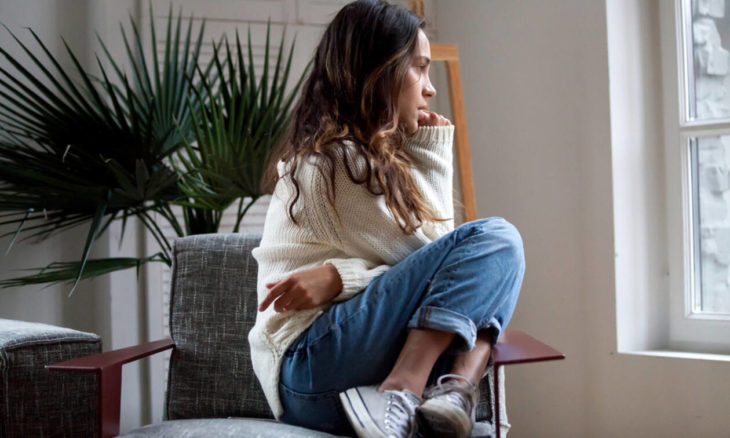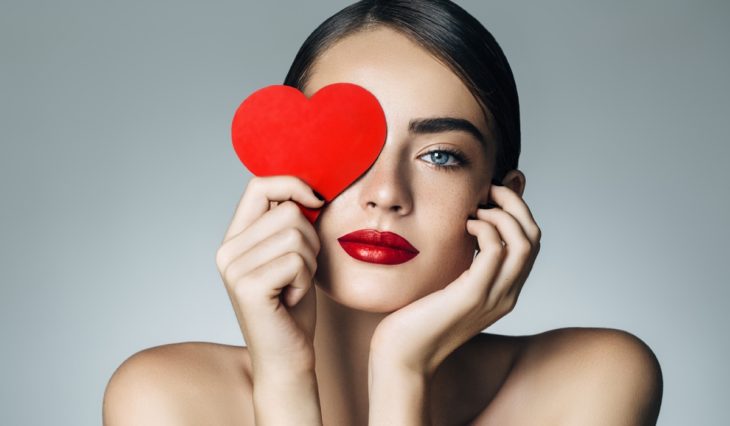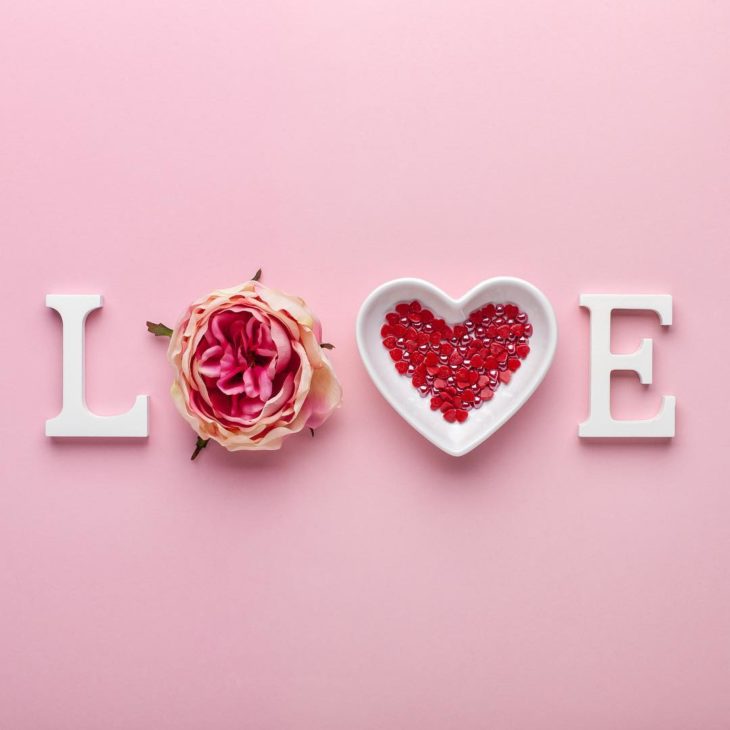You can tell a lot about what’s going on in a woman’s life based on the conversations she has with herself when she looks in a mirror. Sitting in a church or temple pew, or lying awake in bed at night, might be when she does the most deep thinking. But what goes through her head while she glances in the mirror brushing her teeth or washing her hands in the bathroom at work— those are the moments she talks to herself about what she sees. Interacting with her appearance, she’s either a friend or an enemy.
The voice wasn’t telling me I was ugly, exactly, but it pointed out my flaws one by one. The bags under my eyes. The red blemishes. My thin lips. My dry skin. My eyebrows — oh, my stupid eyebrows! The committed relationship is over now, for better or for worse. But that nagging voice is still there when I look in the mirror. I see flaws I just ignored before.

Source: Newsbomb
I decided two-and-a-half years ago to be a friend to myself. It had nothing to do with my appearance, actually; it had to do with dealing with a bout of depression that had waylaid my life. One of the books I was reading at the time about anxiety — I can’t remember which one — discussed talking to yourself in your head the same way you would talk to a friend. A friend would never say, “He’s only interested in much prettier women than you,” or “You didn’t get that assignment because the editor thinks you’re really dumb,” or “The guy who gave you that compliment is probably lying just to mess with your head.” So why would you say those things to yourself? I resolved to make it a point to communicate to myself in my head the way I’d communicate with a friend. And I think my self-esteem has been all the better for it. I can honestly say in the past few years I’ve loved and accepted myself more than I ever have in my whole life. That includes the way I talk to myself when I look in the mirror.
But not lately. Lately I look in the mirror and just see flaws. I see the bags under my eyes. I see the red blemishes on my skin. I see the eyebrows that need to be plucked. I see the limpness in my stick-straight hair. I haven’t normally cared about looking “perfect” and now I keep thinking, What can I do to change?
I’ve always had a pretty casual attitude towards my appearance — not because I don’t care at all, but because I don’t think it should matter so much. Six years ago, I was a newspaper reporter who had to present an aura of professionalism every day with the people I interviewed and came in contact with. For the past two-plus years, though, I’ve worked as a blogger, often from home or sitting anonymously in some godforsaken Starbucks. Whether I put on makeup in the morning really doesn’t have any effect on whether a story gets 100,000 page views. Whether I wear my comfy loafers or my uncomfortable high-heeled boots doesn’t have an effect on whether I’m good at scanning the news headlines and finding stories to write about on the blog. It’s not laziness; it’s just reality.

Source: Lovely
In a way, I’m lucky that I’ve had this detached attitude towards my appearance. Growing up, my mom always told me that I was beautiful. Even when I was 12 years old with dorky glasses and matted hair, Mom told me she loved me. I didn’t believe her then, but I started to believe her as I got older. (Only in the past couple of years has she suggested I’ve gained too much weight, which, admittedly is true. I blame you, Starbucks and sedentary blogging lifestyle!) Genuinely believing you are an attractive person is comforting because you feel less pressure about making an effort — at least, I felt less pressure than it seemed to me other girls did. I started to see how I could affect other people’s behavior toward me with my apperance: I can slip in and out of “being hot.” I’m the sort of pretty that can look really great all done up, or just average. If I wanted to elicit reactions from men, I could dress and make myself up a certain way and look really bangin’. Or I could just wear jeans, a T-shirt and no makeup and be ignored. And I was content to be ignored some of the time if it meant I got to focus on work and other imortant things in my life.
But here’s the thing. Secret time: if I had a couple thousand bucks lying around, I’d go to cosmetology school in my spare time and learn how to become a makeup artist. I don’t want to quit writing or anything; I just want to learn how to apply makeup professionally. I was always an artistically talented kid growing: looming, watercolors, photography. My parents, especially my mom, nurtured my interest in art, as well as my interests in other things, like writing. As I got older, I wrote more and stopped creating things through other means. I don’t have a loom anymore. I don’t have paints or paintbrushes anymore. I don’t think I’d even remember what to do inside a darkroom. But what I do have is lots and lots of makeup.
I actually didn’t care about makeup as a little girl. I hated prissy stuff. I hated prissy stuff straight up through high school when I only dabbled in things I found fun, like sparkly eye makeup, a little bit. Instead, I was more interested in reading about how to put on makeup in women’s magazines. As years passed, I acquired more and more makeup and even books about how to apply makeup, like the one put out by The Body Shop. I have tons of makeup. It has helped that my father worked for a company that made the chemicals in cosmetics so I was able to get tons of stuff cheaply; it has also helped that when you work in the media, companies send you tons of stuff. But I’ve also bought a lot of great makeup myself and I have everything organized in lots of little wicker baskets from IKEA.

Source: Twitter
As I’ve said, I don’t always wear makeup. In fact, I wouldn’t even say I often wear makeup. I did the night I met my ex-boyfriend and I did at the beginning of our relationship, but then as time went on, I reverted back to my normal bare face. I would put on makeup for special occasions or random days I felt like playing with makeup before work (and woke up early enough to do so). But by and large I was just … me.
I know he liked it when I looked pretty — all guys do, to a certain extent. From what little I understand about men, I think they don’t like obvious makeup, but they like feeling proud of their wife or girlfriend when she looks especially pretty. I understand that. So on the few occasions Mr. Jessica said something to me about how pretty I looked with makeup on, or how great I looked in a certain dress or wearing certain shoes, I knew I should do it more to make him happy. It wasn’t a big deal; I didn’t feel like my feminism was compromised or anything — especially not since I, too, had opinions about certain items of clothing he wore.
Our relationship hit the breaks recently and one of the things that Mr. Jessica kept saying again and again was that he wished I dressed up in cuter outfits more often. He bought me a pair of sexy Louboutins for Christmas, surely to add to my struggling-for-hotness wardrobe. Even he acknowledged his concerns were kinda shallow. But he brought it up so often that I knew it must be really bothering him. So I tried to wear makeup more often and wear cuter skirts and dresses, despite the fact it was December and January. I really tried to make more of an effort.
That’s when the voice in my head started criticizing what I saw in the mirror.
The voice wasn’t telling me I was ugly, exactly, but it pointed out my flaws one by one. The bags under my eyes. The red blemishes. My thin lips. My dry skin. My eyebrows — oh, my stupid eyebrows! The committed relationship is over now, for better or for worse. But that nagging voice is still there when I look in the mirror. I see flaws I just ignored before. I think I should use all that makeup for something more than play; I should use it to interact in the world because … because … why?
I don’t want these insecurities to eat away at the self-esteem that I worked so long to build up. That’s not the woman I want to be and I know that’s not the legacy Mr. Jessica wants for me either. I know I’ll never be the (frankly, annoying) woman who can’t leave the house without blush on, although lately I’ve been more similar to her than my old self. It’s uncomfortable and weird. And it’s a byproduct of this breakup I never anticipated.
Original by Jessica Wakeman
